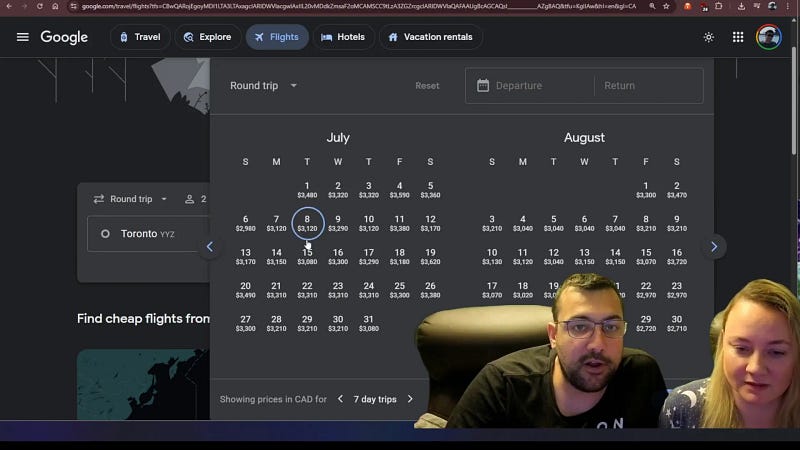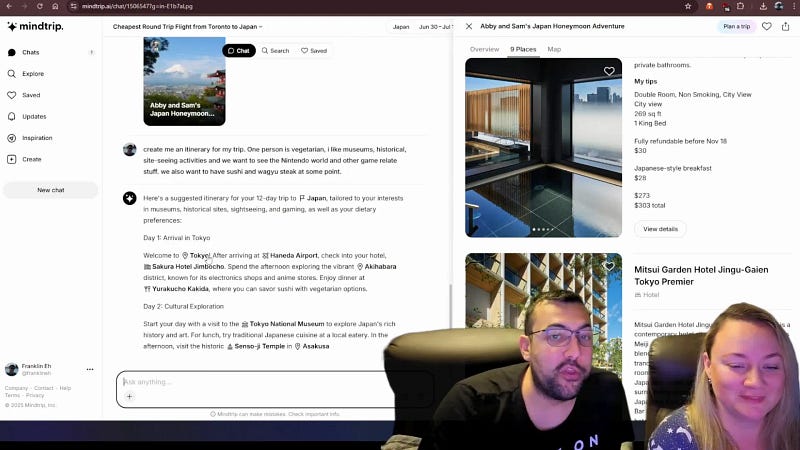AI Case Study: How AI Saved Me $1K on Flights to Japan
Planning a trip can be exciting but also overwhelming, especially when it comes to finding the best deals on flights and accommodations. In…

Planning a trip can be exciting but also overwhelming, especially when it comes to finding the best deals on flights and accommodations. In this AI case study, I’ll share how I leveraged various AI tools to save over $1,000 on flights to Japan, while also creating a personalized itinerary that fits my travel preferences. From generic AI models like ChatGPT to specialized travel AI like MindTrip, this journey shows how AI can transform the way we plan trips — saving money and time, and making travel smarter.
Table of Contents
- The Ultimate AI Travel Hack: Setting the Baseline
- ChatGPT’s Travel Attempt: Helpful Tips but No Magic
- AI Agent MiniMax: Automating the Search
- MindTrip: The AI Travel Tool Designed for Travelers
- The Final Verdict: How AI Saved Me $1,000
- FAQs About Using AI for Travel Planning
The Ultimate AI Travel Hack: Setting the Baseline
To kick off this AI case study, the first step was establishing a baseline price for flights from Toronto to Japan in July. Using Google Flights, I searched for round-trip tickets for two adults and found nonstop flights priced around $3,900. While the prices fluctuated slightly depending on departure dates, this gave me a clear benchmark to beat.

Choosing a flight with two nonstop legs, I locked in that $3,914 figure as my baseline — knowing that any AI tool I tested would need to beat this price to prove its worth.
While $3,900 is a reasonable price for nonstop flights, I wondered if AI could uncover cheaper options, even if it meant a few layovers. This opened the door to experimenting with different AI-powered travel tools.
ChatGPT’s Travel Attempt: Helpful Tips but No Magic
My first stop was using ChatGPT with its web search functionality. I gave it a straightforward prompt:
“I’m planning a trip to Japan for July. Find the cheapest round trip flight for two adults from Toronto to Japan.”
ChatGPT’s response was interesting but limited. It suggested buying two one-way tickets instead of a round trip and mentioned checking budget airlines and layovers as cost-saving tricks. However, it didn’t actually book or find the flights for me — it mostly pointed me to apps like Skyscanner and Flare to do the searching myself.
While ChatGPT showed some savvy travel hacks, it wasn’t a hands-off solution. It essentially nudged me to do the legwork manually, which didn’t save much time or money compared to my baseline.
AI Agent MiniMax: Automating the Search
Next, I turned to an AI agent called MiniMax, which promised to automate the flight search process. Using the same prompt, MiniMax took over the web searching and analyzed over 420 flights and 28 date combinations for July 2025.

The result? MiniMax found a flight priced at $2,721 — significantly cheaper than Google Flights. But there was a catch: the flight included up to five layovers and took a whopping 33 hours one way. While the price was tempting, the inconvenience of such a long journey made me reconsider.
This highlighted an important lesson in this AI case study: the cheapest option isn’t always the best. When using AI to save money, it’s crucial to balance price with convenience and travel experience.
MindTrip: The AI Travel Tool Designed for Travelers
Finally, I tested MindTrip, an AI tool built specifically for travel planning. Unlike generic AI models or agents, MindTrip offers an all-in-one solution: finding flights, creating itineraries, and even booking trips.

MindTrip initially found a nonstop round-trip flight for $2,975, which was $200 more than MiniMax’s cheapest option but saved me from multiple layovers and long travel times. For a 12-day trip starting June 30th, it returned $3,000 total — still $900 cheaper than my original baseline.
What sets MindTrip apart is its seamless integration with booking platforms like Priceline, allowing me to book flights instantly through its interface. This saved me both money and valuable time.
Personalized Itinerary Creation
Beyond flights, MindTrip impressed me with its ability to generate a detailed, personalized itinerary. By telling it I’m vegetarian while my husband isn’t, and that I enjoy museums, historical sightseeing, and gaming experiences like Nintendo World, it created a tailored 12-day plan complete with restaurant recommendations (including sushi and Wagyu steak spots), hotel bookings, and daily activities.

The itinerary even included a map, a calendar of bookings, and links to book hotels and attractions directly. It could adjust based on budget preferences, making the trip planning process smooth and enjoyable.
The Final Verdict: How AI Saved Me $1,000
Through this AI case study, it’s clear that AI tools have the power to revolutionize travel planning:
- ChatGPT provides useful tips but requires manual effort.
- MiniMax AI agent automates flight search and finds the lowest prices but may sacrifice convenience.
- MindTrip combines flight deals, itinerary planning, and booking in one user-friendly platform, balancing cost savings with travel comfort.
By using MindTrip, I saved at least $1,000 compared to my initial Google Flights baseline, avoided multiple exhausting layovers, and gained a personalized itinerary tailored to my preferences — all with minimal effort.
With AI evolving rapidly, travel planning is becoming smarter, more efficient, and much more affordable. This AI case study proves that embracing AI tools can unlock incredible savings and enhance your overall travel experience.
FAQs About Using AI for Travel Planning
Can AI really find cheaper flights than traditional search engines?
Yes! AI tools like MiniMax and MindTrip can analyze thousands of flight options and date combinations quickly, sometimes uncovering deals that traditional search engines may miss.
Is the cheapest flight always the best option?
Not necessarily. Cheaper flights often come with longer travel times and multiple layovers. It’s important to consider convenience, travel time, and comfort alongside price.
How personalized can AI travel itineraries be?
Very personalized! AI tools can tailor itineraries based on dietary preferences, interests, budget, and desired activities, creating detailed daily plans with restaurant and hotel recommendations.
Are AI travel booking tools safe to use?
Yes, reputable AI travel tools link to trusted booking platforms like Priceline. Always verify the booking site before making payments.
Can AI help with other aspects of travel besides flights?
Absolutely. Many AI tools assist with hotel bookings, activity planning, transportation, and even real-time travel updates, making your entire trip smoother.
If you want to travel smarter, save money, and enjoy a stress-free planning experience, embracing AI travel tools is the way forward. Happy travels!
This article is based on comprehensive research derived in part from the referenced video AI Saved Me $1K on Flights to Japan!




